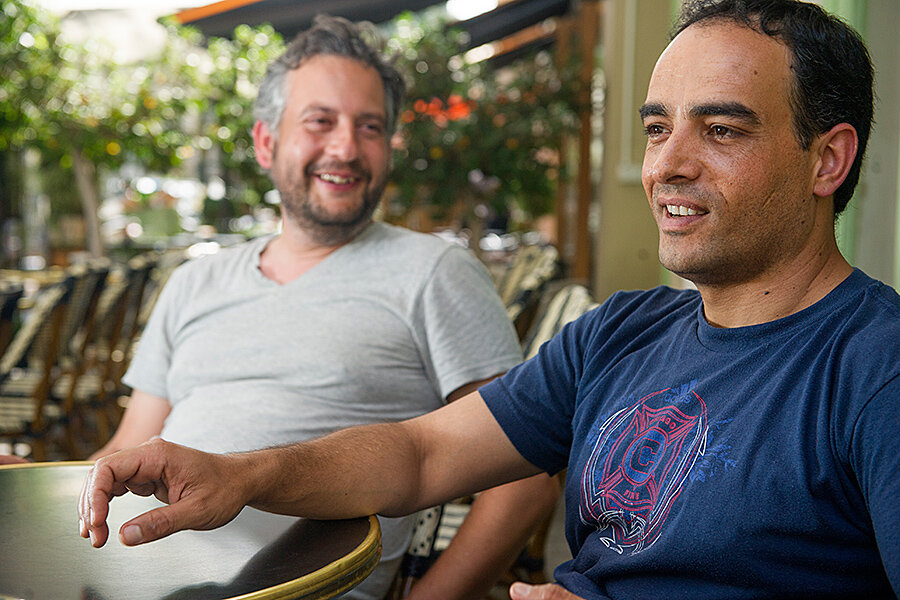Sitting years ago on the bluffs of the Mississippi, it was hard for me to imagine Israel’s landscape as Michael Bavly and Forsan Hussein described their home.
I had invited the unlikely duo from Brandeis University – an Israeli Jew from a wealthy family and a Palestinian citizen of Israel on scholarship, who co-hosted a radio show about coexistence – to speak at my college. They invited me then to visit their country.
They were recklessly optimistic about peace. I was ignorantly so.
It took 12 years for us all to meet up on their turf, but finally we reunite at a Tel Aviv café. The ideas Michael and Forsan hashed out at Brandeis in a 35-page peace agreement, the Bostonian Understandings, aren’t very popular anymore.
The Palestinian Authority (PA) is hobbled – not only by Israel’s occupation of the West Bank, but also by inefficiency and corruption. Hamas, the Islamist movement whose charter calls for the destruction of Israel, saw its popularity spike during and after last summer’s hugely destructive Gaza war. Now it is reportedly engaged in talks to reach a long-term truce with Israel amid signs the Islamic State (IS) is trying to get a foothold in Gaza.
Israeli Prime Minister Benjamin Netanyahu recently surged to an unprecedented fourth term after saying there would be no Palestinian state on his watch and warning Jews on the eve of elections that the country’s minority Arab voters were “coming out [to the polls] in droves.”
“The election brought a realization.… It is not just government policies that we need to change; rather, it is the thoughts and perceptions of the people that must be dealt with,” Michael says, describing Israeli voters as easily intimidated. “So Forsan equals Hamas equals [IS].”
In fact, Forsan is a Harvard MBA who spent the past five years as CEO of the Jerusalem YMCA, a hub of Jewish-Arab initiatives, and recently founded a venture capitalist firm with an Israeli partner. By mid-year they had already invested more than $10 million in companies with a demonstrated commitment to Jewish-Arab cooperation.
“One of the values we, Zaitoun Ventures, are trying to promote and enhance and develop is the value of diversity,” says Forsan, citing the American idea of strength in diversity. “In Israel, I feel oftentimes suspicion comes from diversity, and not strength.”
Forsan is part of Israel’s 20 percent Arab minority, who are often marginalized as second-class citizens. Despite his extraordinary success, he describes himself as a stranger among Jews in Israel, and says Israelis can do a better job living up to the Torah commandment to love the strangers among them.
Michael is teaching his toddler son, Adam, to do that, starting by learning the Arabic alphabet. A new partner with the law firm Glusman & Co., Michael was recently tapped to open a branch in the Galilee, where many of Israel’s Arabs live. He’s using his understanding of both cultures to help local businesses bridge cultural gaps. Already the firm has helped establish an Arab-run dialysis center and a Jewish-Arab technological center.
“Peace by daily action,” he says. “The idea is to live together instead of just talk about it.”
He sees two possible scenarios for the next decade. Either the status quo will evolve into something more permanent, or a peace treaty will be signed in the next few years. This peace would initially be fragile, with “random acts of terror” on both sides. But gradually, he says, that would change.
“Trust would be reinforced by daily acts of living, mundane as they [may] be – economic cooperation, tourism, research and development – these are all essential to our mutual prosperity.”
Forsan is trying to create momentum in that direction with Zaitoun Ventures. “Naïve as it may sound, my hope is to generate enough goodwill and enough good examples to create that snowball effect.”








